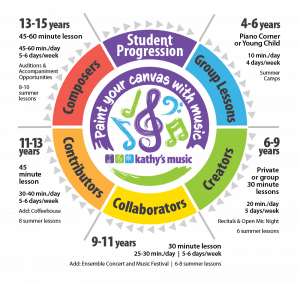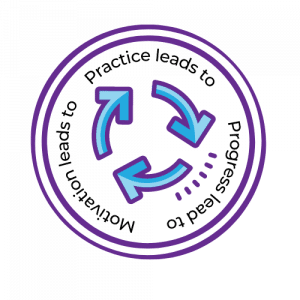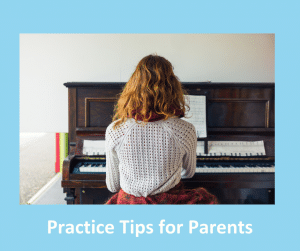by Anoush Tchakarian, Adjunct Professor of Piano at Duquesne University and Interim Area Coordinator for Keyboard & Sacred Music. Anoush is also a guest blogger for Kathy’s Music.
Establishing and sustaining effective practice habits are vital for the progress of all music students. The progression of each music student is not an exact science, but rather a long-term project. By establishing basic practice habits, students will begin to see what is possible when inspiration, dedication, and perseverance are all part of the learning process.
-
Time Investment
Dedicating time and developing quality practice habits are an undeniable part in becoming a skillful musician,
capable of tackling any future music projects. Our love of music is driving and the enthusiasm of our teachers is contagious, but these elements alone are not sustaining forces.
A thriving musical development is impossible without the continuous effort of students (and parents) outside their lesson time. Even when the popular purpose of taking music lessons is not becoming a professional musician but simply enjoying music as a recreational art, having established a consistent practice routine and healthy motor skill habits is quite important. This is the step in musical growth which allows a student to take the skills and knowledge imparted in lessons and make them his or her own.
As a teacher my ultimate goal is for all students regardless of age to become as independent as possible, setting a good start and healthy habits with them, thus effectively having no need of my guidance or help down the road. I cherish the moment when I am no longer needed. That very moment when students find the answers independently and are able to do it all by themselves is an unforgettable experience.
-
Quality Practice Outside Lessons
Success is directly connected to the quality of the practice sessions outside lessons, not the quantity.Effective time management has become even more important in recent years, since children are often involved in several extra-curricular activities.
Set specific goals ahead of practice time. Mindful practice and self-awareness are required for achieving these set goals. One may ask what is meant by “mindful” when it comes to playing an instrument. Analyzing and simply focusing on separated details of the assigned piece is a great start towards creating a mindful practice habit. Setting specific practice goals at the very start of the practice time is crucial and saves time in the long run.
Attention to details is imperative and it will make the practice session much less frustrating. If students dedicate 15 minutes to practicing only a hard transition between two measures and fixing the text only within these two measures, then they will accomplish much more ease once they return to the beginning of the piece.
There is no sense to start the piece over and over again from the beginning, if the challenging section has not been addressed first. Starting the piece repeatedly from the beginning when mistakes occur throughout the piece not only wastes precious practice time, but it creates a great deal of frustration. After a while students stop listening to and paying attention to what is happening with the rest of the piece, and by doing so it is not uncommon to make new overlooked mistakes. This can be avoided by taking a break and returning to the piece at a later time.
True – repetition does make it better, but it matters most how we repeat. The ability to prioritize in order to build the bigger picture is an invaluable skill to possess, and will help in all aspects of life. That leads me to the teachers’ notes and the importance of following the teacher’s advice.
-
Parent Support
The most fundamental step towards establishing good and consistent practice habits is the parents’ role,especially when it comes to the beginner student. The time parents invest to give a helping hand to their children at home and to set a regular practice routine is invaluable.
When parents provide time and support (ideally 10 to 20 minutes a day or more with required breaks) their children will be much more successful and eager to practice their instrument. Creating music together regardless of parents’ musical literacy – singing together, clapping together, dancing together– will not only help the child grow musically, but will also create a stronger bond within the family unit.
That type of activity and reinforcement will also help with public performances and managing performance anxiety. Children who regularly play for or with their families are much more comfortable during a concert appearance. Parental involvement in the process is very helpful for the teachers, as well. We are a team! We invite you to ask questions as often as you like.
Together we can help your child achieve their goals and inspire them to mastery.
-
Observation and Self-awareness
When followed closely and applied diligently, instructor’s input will be of tremendous help with the overall progress. It will make the practice process a much better experience as a whole.Reading your practice assignments in Practice Space prior to each practice session with your son or daughter is a great starting point. Video recording of practice sessions is a very useful and objective tool. Observing the practice is part of the process, and it is always a good idea to share it with the teachers.
Often teachers will notice something during the practice time at home that can be addressed and improved.
I would like to conclude by emphasizing the importance of a virtue that in our age of instant results and instant gratification seems forgotten – patience. Patience in my modest experience can be taught and cultivated. Being patient, persistent, and tenacious are part of the game. Nothing will change overnight. Everyone learns differently, setting their own pace. To be patient though is a required ingredient in order to be successful whether will be in art, science, or sports.

 capable of tackling any future music projects. Our love of music is driving and the enthusiasm of our teachers is contagious, but
capable of tackling any future music projects. Our love of music is driving and the enthusiasm of our teachers is contagious, but Effective time management has become even more important in recent years, since children are often
Effective time management has become even more important in recent years, since children are often especially when it comes to the beginner student. The time parents invest to give a helping hand to their children at home and to set a regular practice routine is invaluable.
especially when it comes to the beginner student. The time parents invest to give a helping hand to their children at home and to set a regular practice routine is invaluable.